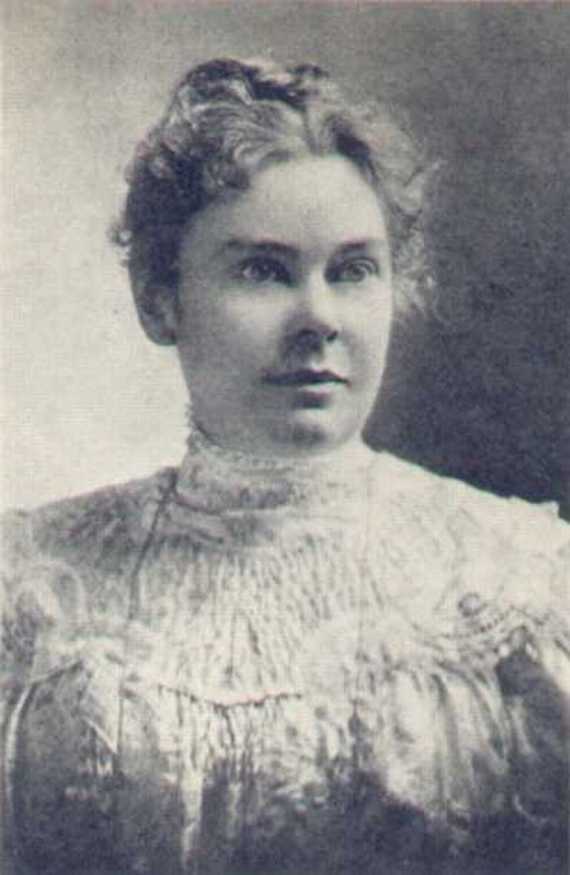In 2011, I spent three weeks alone in St. Petersburg, Russia, conducting research for my undergraduate thesis. During that time, I rented an apartment belonging to a family friend’s former nanny. Like most Russians, the nanny was out of town for the season, but her pregnant daughter Nastya lived in the adjoining apartment with her husband Tolik. Although they must have had work, they seemed to be home, like me, at odd hours of the day. Occasionally I would return from the library to find Tolik smoking a furtive cigarette out of the open living room window, or huge vats of fruit boiling, unattended, on the stove. This meant Nastya was making jam, which I would later eat in tiny stolen spoonfuls from the excess jars she stored in her mother’s fridge.
I had hoped Nastya and Tolik would provide a social counterbalance to my asocial days of reading and translating, but the couple adhered to a strict policy of benign neglect. After days without a real conversation, the icons hanging in my bedroom began to take on sympathetic expressions as I vented my research-related frustrations aloud. I was relieved when Nastya and Tolik came over, late one Monday night, to invite me on a daytrip to Finland. They were planning to scope out cheap land for a dacha, Russia’s unpretentious version of the summer home. Naturally, I accepted.
We piled into their well-aged, light blue sedan around 9am on a Wednesday. Tolik drove, Nastya sat in the passenger seat, and I got in the back, which felt cramped even for me who, at 5’2”, was last considered tall in the fifth grade. After stopping for cash at a nearby ATM (for bribes at the border?), we were off. Immediately Tolik bombarded me with questions: Does everyone in America own a gun? Do you have black friends? What’s your grandmother’s pension? What sort of car do you drive? I began to wonder if he had been keeping a list since I arrived. To most of them I pled ignorance (“I don’t know” being one of my favorite Russian phrases), or demurred, “New York City isn’t really America.” Tolik either ran through all the questions on his list, or grew weary of my diplomatic answers, because eventually he turned up the Russian pop on the radio and relaxed into the drive.
I did not relax. I worried about my lungs (the car smelt strongly of diesel) and my teeth (might the engine’s vibrations cause one to chip?), while wistfully eying the poetry book I had brought (if only I had thought of ear plugs…) Trees stood a few feet from the road on both sides; there was nothing to look at but forest, and it all looked the same. Maybe, I thought, I should have stayed home.
As we approached the border crossing, Tolik pulled onto the shoulder and turned the music down. “Do you have your passport?” I held it out to him, visa page open. It was, I realized, a single-entry visa, meaning once I left Russia, I wasn’t allowed to come back. “Put it away,” he told me. Then, “Don’t say anything.” He smiled before turning back onto the road. The guard booths advanced. Visions of Russian prison danced in my head. Tolik rolled down his window and began speaking to the guard like they were old friends from school. Within two minutes, they had waved us into Finland without asking to see so much as a driver’s license.
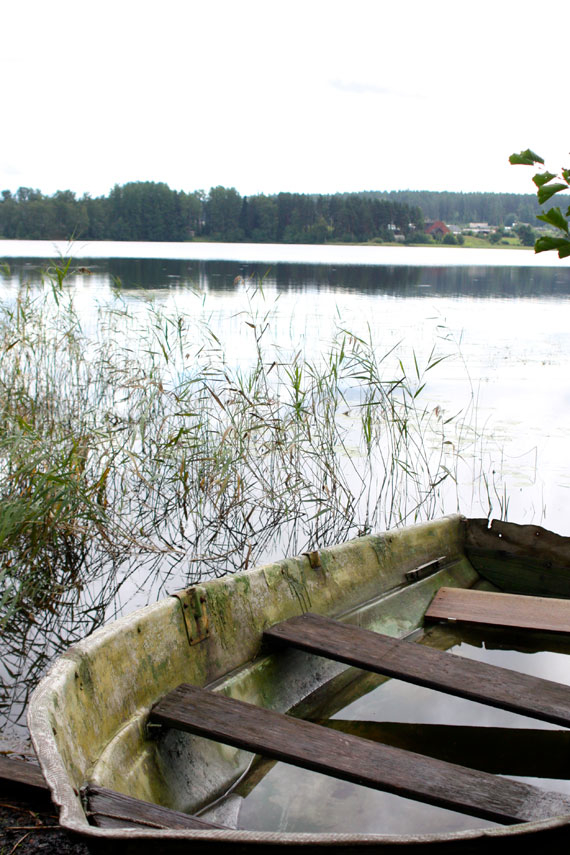
Tolik and Nastya did not appear to have a destination in mind: they were actively scanning the landscape through their windows, hoping, I imagined, to spot the perfect plot for their dacha, illuminated by a ray of sunlight or ringed, perhaps, with daisies. What they were looking for, it turned out, was water. Tolik hooked a left down a gravel road on the far side of a large lake. It led us to a large decrepit building that looked as if it had once served as an asylum. While Tolik and Nastya searched for a woman to interrogate about the area, I wandered off to photograph a Jeep decaying in the forest.
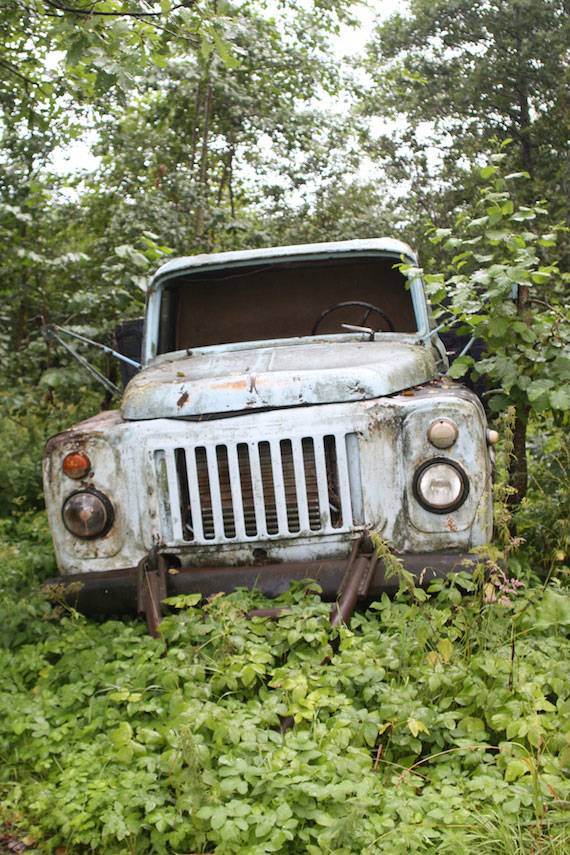
On the way back, we stopped at Vyborg to see an ancient Swedish fortress. As is often the case in Northern Russia, the day, which had started off blue as a Picasso painting, had turned cold and grey. Only a few minutes after we left the car, the clouds burst open.
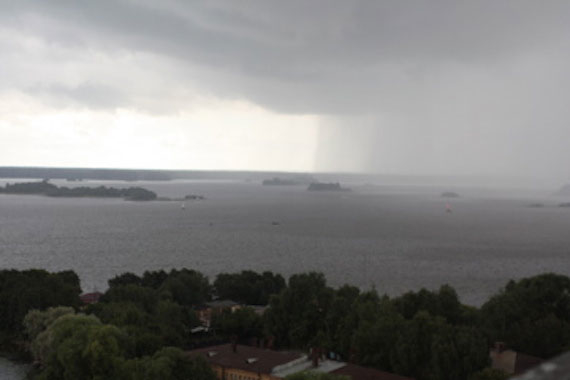
“Run!” Nastya shrieked.
We were soaked and breathless when we finally reached the museum. Nastya twisted her hair and laughed as a thin stream of water fell to the floor. Tolik bought us all coffees from a vending machine. We drank them standing up. Then, since the rain had abated, we decided to climb the tower. In the 15 minutes it took to scale the steep, winding stairs, the sun had come out and a rainbow had formed. Tolik insisted on taking several photos of me in front of it, all of which he proclaimed “beautiful,” although, when I looked at them later, I found my eyes were closed in all but two of the pictures.
The drive back was long and miserable. By the time we got home, around 6pm, I was irritable and hungry enough to regret giving up a day of solitude for one transcendent moment in the rain.
But something changed after that. Nastya told me to help myself to her jam. Tolik would offer me a cigarette whenever he came in to smoke even though each time I politely declined. The rain had washed some invisible boundary away.
The following December I got an email from them, wishing me a happy new year. “If you’re planning to come to St. Petersburg in the New Year, stop by for tea,” they wrote, before signing off, “Your Russian friends.”
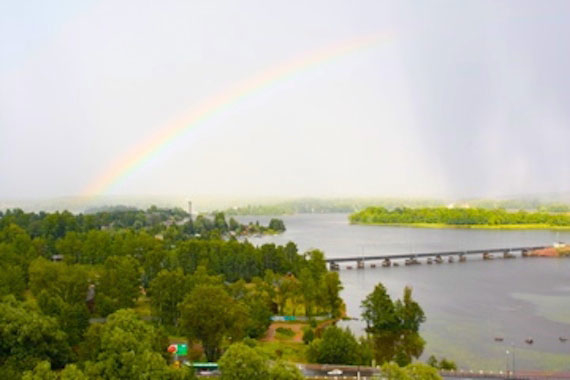
Images courtesy the author




